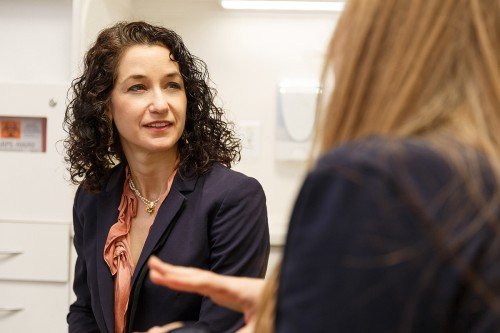
Highly effective treatment for HIV/AIDS, in the form of a triple cocktail of drugs, has been available since the late 1990s. Credit: GAR0/ Science Source
When the AIDS epidemic began in 1981, many of the first reported cases were young gay men who were diagnosed with a rare form of cancer. Called Kaposi sarcoma, it appeared as purple blotches on the skin, often on the legs and face. This type of cancer was not previously known to affect men at such a young age or be this aggressive. For a time, before the term “acquired immune deficiency syndrome” was coined, the mysterious new illness was dubbed the “gay cancer.”
Scientists now know that cancer sometimes occurs in HIV-infected people because their immune system is severely weakened. They cannot fight off cancer as well as healthy people can.
Now that effective HIV-suppressing medications exist, the landscape of AIDS-related cancers is changing. In an interview, Mark Dickson, a medical oncologist at Memorial Sloan Kettering who specializes in treating people with sarcoma, explains what the current picture looks like.
What types of cancer are more common in people with HIV/AIDS?
Historically, there’s been this disease category called AIDS-defining cancers. Certain cancers were much more common in people infected with HIV starting in the 1980s. Those cancers were predominantly Kaposi sarcoma, lymphoma, and cervical cancer. Interestingly, all of them are caused by, or associated with, viral infections — viruses separate from HIV.
People with HIV can also develop what are considered non-AIDS-defining cancers. This includes pretty much every other type of cancer that occurs in someone who happens to be HIV infected. That part of the epidemic has evolved over the last 20-plus years since the introduction of protease inhibitors. Now that people who are HIV infected are living into their 50s, 60s, and 70s, they’re getting all the other cancers that uninfected people tend to get if they live that long.
How has the treatment of AIDS-defining cancers changed over time?
There’s a couple of different ways to look at the story. Kaposi sarcoma still occurs in a number of different settings. There’s the classic form of Kaposi sarcoma, also called Mediterranean Kaposi sarcoma, which occurs in older adults who are not HIV infected and is generally slow growing. There are also HIV-negative people who are on immunosuppressive drugs — for example, for a kidney transplant — who are at a higher risk for Kaposi sarcoma.
We still occasionally see people with newly diagnosed HIV/AIDS who have Kaposi sarcoma. Most of them are treated with antiretroviral therapy. Often just starting antiretroviral therapy and getting their immune system stronger leads to improvement in the cancer.
The second big change in AIDS-defining cancers has been figuring out how best to treat people with, for example, non-Hodgkin lymphoma. Initially, there was a big concern that if your immune system was weakened from HIV/AIDS, you might not be able to handle the chemotherapy that’s used to treat and often cure non-Hodgkin lymphoma. A lot of research has been done in the last decade to demonstrate that you can combine intensive chemotherapy and highly active antiretroviral therapies and get good outcomes. You can even do stem cell transplants in HIV-positive people.
A big research effort of the AIDS Malignancy Consortium (AMC), which I’m a part of, has been to design clinical trials specifically for people who are HIV positive. The AMC has a portfolio of clinical trials for people with AIDS-defining cancers. There’s also a big effort to develop clinical trials for HIV-positive people with non-AIDS-defining cancers. There’s an ongoing clinical trial sponsored by the AMC that is looking at immunotherapy drugs, like ipilimumab (Yervoy®) and nivolumab (Opdivo®) specifically, in HIV-positive people with common cancers, like lung cancer and colon cancer. There’s extensive work being done to figure out how immunotherapy interacts with HIV medications, how it affects CD4 counts, viral load, and so on.
Has the incidence of AIDS-defining cancers gone down a lot as people have been on antiretroviral therapy?
Certainly. The introduction of protease inhibitors in the late 1990s led to a pretty steep decline in such diseases as Kaposi sarcoma. It’s also shifted the severity of the illness. We’re not seeing the sort of advanced cases of Kaposi sarcoma with extensive lymph node involvement that we saw in the early days of the epidemic. We’re seeing milder cases, often limited to the skin.
Then there’s a group of HIV-negative men who have sex with men and are getting what looks like the classic form of Kaposi sarcoma: mild, indolent, usually confined to the skin of the lower extremities. But they’re getting it a couple of decades earlier than you’d normally expect. We suspect it’s related to sexual transmission of the Kaposi sarcoma herpesvirus even in men who are HIV negative, just because of the behavioral risk factors. So we’re interested in studying that clinical phenomenon.
Is a higher risk of certain cancers still a problem in people who are on antiretroviral therapy?
Even people who have well-controlled HIV are not quite immunologically normal. They are at a higher risk for getting lymphoma, and they may be more susceptible to virally caused cancers. In addition to Kaposi sarcoma, they are more susceptible to cervical cancer and anal cancer, which are caused by the human papillomavirus (HPV). Thank goodness there’s finally an effective vaccine for HPV. In theory, as more people are vaccinated, the rates of these preventable cancers should decline. There’s a complex interaction between the immune system, its function in chronic HIV infection, and the viruses that increase the risk of cancer. There’s a lot of work to be done to understand all of these relationships.
Who at MSK cares for HIV-positive people with cancer?
As a medical oncologist who specializes in treating soft tissue sarcoma, I see all of the people who come to MSK with Kaposi sarcoma. It’s a relatively rare disease, but we probably see about 40 new people a year. Ariela Noy in the Lymphoma Service has a special interest in treating people with HIV-associated lymphoma. People with other cancers who happen to be HIV positive are treated throughout MSK, just as they would be if they did not have HIV.
What is the most common misunderstanding about AIDS and cancer?
One common misunderstanding is that being diagnosed with Kaposi sarcoma means you have AIDS, and that’s actually not correct. You can get Kaposi sarcoma even if you’re HIV negative. For people who associate Kaposi sarcoma with AIDS, the diagnosis can be pretty upsetting. Fortunately, those fears can often quickly be banished.
It’s also important to know that people whose HIV infections are well controlled on antiretroviral therapy have a basically normal life expectancy. When they are diagnosed with cancer, they should be given standard treatment, just like everyone else. The intensity of the cancer treatment should not be changed just because the person happens to be HIV positive.





